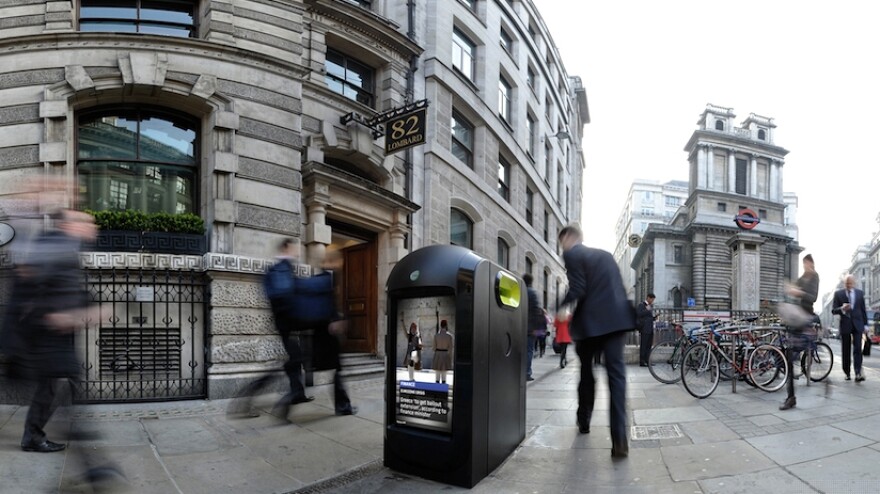The city of London has ordered a company to cease tracking the cellphones of pedestrians who pass its recycling bins, which also double as kiosks showing video advertisements. The bins logged data about any Wi-Fi-enabled device that passed within range.
The company, called Renew, recently added the tracking technology to about a dozen of the 100 bins it had installed before London hosted the 2012 Summer Olympics.
"The idea," as the website Quartz wrote last week, "is to bring internet tracking cookies to the real world." The title of the Quartz post that first reported the tracking program was, "This recycling bin is following you."
That story generated concern in Britain, with privacy advocates saying the program went too far in tracking people's movements without their consent. Such systems could report new or repeat visits to an area and, if combined with data from trackers in stores and elsewhere, could form a detailed picture of a consumer's habits.
The system reportedly used technology from Presence Orb, whose website features the tagline "a cookie for the real world."
As Quartz reports, the practice of monitoring smartphones and similar devices isn't as regulated as online tracking. And unlike a computer logging an Internet cookie, most mobile devices do not record contact with tracking systems that detect and record the devices' attempts to connect to a Wi-Fi network.
From the BBC:
"The bins, which are located in the Cheapside area of central London, log the media access control (MAC) address of individual smartphones — a unique identification code carried by all devices that can connect to a network."
That reportedly ended Monday, when a spokesman for the city of London's local authority says, "We have already asked the firm concerned to stop this data collection immediately and we have also taken the issue to the Information Commissioner's Office. Irrespective of what's technically possible, anything that happens like this on the streets needs to be done carefully, with the backing of an informed public."
In a statement issued Monday, Renew says the program was merely a trial of "a glorified counter on the street," which it is no longer conducting.
"I'm afraid that in the interest of a good headline and story there has been an emphasis on style over substance that makes our technology trial slightly more interesting than it is," company CEO Kaveh Memari said. He added that many of the capabilities reported in the media had not yet been developed, saying that the program had resulted in "extremely limited, encrypted, anonymous/aggregated data."
British privacy group Big Brother Watch welcomed London's move to end the program, but it added that such monitoring shouldn't have been done in the first place.
"Systems like this highlight how technology has made tracking us much easier," Big Brother Watch director Nick Pickles tells the BBC, "and in the rush to generate data and revenue there is not enough of a deterrent for people to stop and ensure that people are asked to give their consent before any data is collected."
The broader vulnerability of cellphones was highlighted in an NPR report earlier this summer, when Laura Sydell explained "How hackers tapped into my cellphone for less than $300."
Copyright 2021 NPR. To see more, visit https://www.npr.org.


